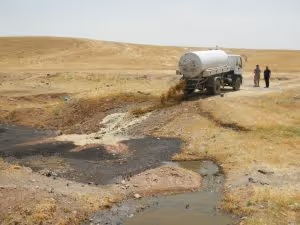Developing and Disseminating Guidance on Faecal Sludge Disposal Sites

In 2013, the the Humanitarian Innovation Fund (HIF) commissioned a Gap Analysis to identify key challenges in emergency Water Sanitation and Hygiene (WASH). This highlighted improving faecal sludge management during emergencies as an area requiring urgent attention. Specifically, methods for disposing of bulk faecal sludge have been highlighted as a significant problem, particularly during rapid onset emergencies.
Despite the numerous innovations and technologies for a variety of humanitarian contexts that have emerged, there is still a knowledge gap among persons responsible for managing the disposal of bulk faecal sludge during rapid onset emergencies (within the first 6 months).
This research aims to understandwhat are the driving forces behind the decisions made on faecal sludge management in first phase emergencies. With this understanding, more targeted and effective methods of disseminating technical information or guidance on faecal sludge management can be developed. Additionally, this work will identify and review all emerging and proven technical solutions for disposal faecal sludge in first phase emergencies.
Top image: Faecal sludge being disposed of into a water body, Kurdish Region Iraq
Stay updated
Sign up for our newsletter to receive regular updates on resources, news, and insights like this. Don’t miss out on important information that can help you stay informed and engaged.
Explore Elrha
Learn more about our mission, the organisations we support, and the resources we provide to drive research and innovation in humanitarian response.


.png)